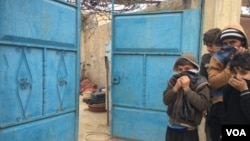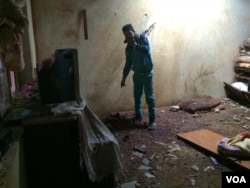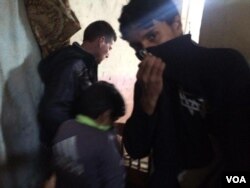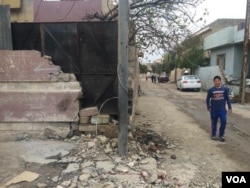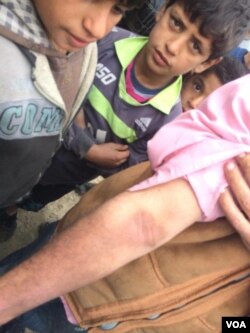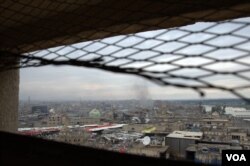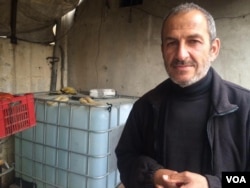"Some soldiers said the house has to be destroyed," said Dhia Deen, a taxi driver on the street next to the site of the alleged worst chemical attack in Mosul. "Even our cows are getting sick."
The home that was bombed in early March does not have to be pointed out. Weeks after the incident, the smell is still rancid and neighbors complain of watering eyes and skin problems.
Regardless of the apparent danger, a crowd of children burst into the home of their neighbor, Natham Hamad, eager to show us the hole in the ceiling and the bomb now planted in the floor.
They are smart enough to cover their mouths and noses with their shirts, and avoid touching anything. The inside of the home is coated with something that looks like yellow sulfur powder.
The smell inside is overwhelming. The neighbors soon scurry out of the house and away from the door. "The smell is better than it was," said Ahmed Farah, a carpenter. "But when it rains, it gets really bad."
Shortly after the attack early this month, local officials said the Hamad home and at least four other civilian houses in eastern Mosul were bombed by Islamic State militants with weapons containing homemade chemical poisons. International Committee of the Red Cross doctors said patients' symptoms indicated mustard gas.
Some Iraqi officials later said that they had not seen evidence IS has the capacity to deploy chemical weapons. Others in Mosul qualified that statement, saying IS has only the capacity to use crude homemade chemical weapons that emit non-deadly poisons.
In the neighborhoods that were hit, families say they care less about what hit them than about getting it cleaned up. But chemical cleanup requires some expertise, and cannot be done with soap and water, says Yahya Kassim, a 51-year-old father of seven who was hospitalized after a bomb emitting foul-smelling black oil fell in his yard in early March.
"They should come to my house and smell it," he said in the yard. The smell is less pungent than it was last week because a neighbor paid for the removal of some of the poisoned bricks scattered in the attack. But the sickening odor returns in the rain, he said.
"Or tell them to call me," he added. "I'll explain what happened."
'Contingency planning'
At an Irbil hospital on Friday, Hamad's wife and five children are recovering and are planning to be released Saturday.
The family is better but they still have damaged immune systems, said Dr. Johannes Schad of ICRC.
At least 15 patients have been treated in Irbil in recent weeks for symptoms consistent with chemical attacks, including blistering skin, and respiratory and eye problems. Near the bombings in Mosul, dozens of people tell us they have experienced symptoms but have very little access to health care.
And while there have been no new reports of suspected chemical weapons in recent weeks, international organizations continue to build capacity, preparing for more victims of chemical weapons.
"You can see this is some kind of chemical agent," Schad said. "We are contingency planning. The situation is getting more tense."
Iraqi forces say the battle for Mosul has never been fiercer than now, as it moves in on the last quarter of the city held by IS. In previous months, militants often fled as Iraqi forces moved in. Now, they are surrounded and fighting back with everything they can.
As the fighting gets more intense, the humanitarian crisis surrounding the war has become overwhelming, with nearly 275,000 people displaced since operations began in October. Trauma centers have seen at least 5,000 civilian patients.
And among the displaced could soon be Hamad and his family, as his home is no longer livable.
"I don't know where we will go," he said, standing by the hospital room door. "Even if we go to friends or relatives, we can stay only for a few days."
Test results
In Mosul, patients released weeks ago show us ICRC documents that call them "suspected victim[s] of mustard gas," but no one we speak to has received formal test results.
The ICRC says they have not received results of tests taken in early March. In Mosul, local police confirm the presence of chemicals in the bombs, but locals have not been told exactly what hit them.
"First they told me it would be a few hours for the results," Kassim said. "Then they told me the United Nations will get the results."
The United Nations said it is not mandated to carry out an investigation of the suspected IS chemical weapons in Iraq, although it has condemned the attacks.
At the hospital, Hamad says his family expects to receive the information after they are released.
"Thank God," he said. "At least my children are better."




